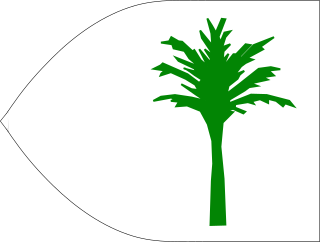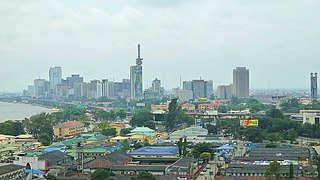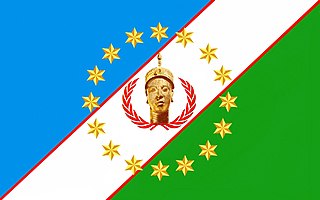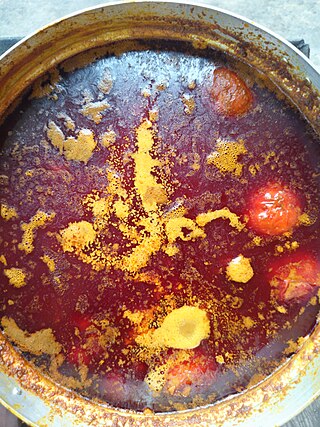Related Research Articles

The Kanem–Bornu Empire existed in areas which are now part of Nigeria, Niger, Cameroon, Libya and Chad. It was known to the Arabian geographers as the Kanem Empire from the 8th century AD onward and lasted as the independent kingdom of Bornu until 1900.

Nigeria, officially the Federal Republic of Nigeria, is a country in West Africa. It is situated between the Sahel to the north and the Gulf of Guinea to the south in the Atlantic Ocean. It covers an area of 923,769 square kilometres (356,669 sq mi), and with a population of over 230 million, it is the most populous country in Africa, and the world's sixth-most populous country. Nigeria borders Niger in the north, Chad in the northeast, Cameroon in the east, and Benin in the west. Nigeria is a federal republic comprising 36 states and the Federal Capital Territory, where the capital, Abuja, is located. The largest city in Nigeria is Lagos, one of the largest metropolitan areas in the world and the largest in Africa.

Akinwande Oluwole Babatunde Soyinka Hon. FRSL, known as Wole Soyinka, is a Nigerian playwright, novelist, poet, and essayist in the English language. He was awarded the 1986 Nobel Prize in Literature for "in a wide cultural perspective and with poetic overtones fashioning the drama of existence", the first sub-Saharan African to be honoured in that category.

Lagos or Lagos City is the most populous city in Nigeria, with an estimated population of 21 million in 2015. Lagos is the most populous urban area in Africa. Lagos was the national capital of Nigeria until December 1991 following the government's decision to move their capital to Abuja in the centre of the country. Lagos is a major African financial centre and is the economic hub of Lagos State and Nigeria at large. The city has a significant influence on commerce, entertainment, technology, education, politics, tourism, art, and fashion in Africa. Lagos is also among the top ten of the world's fastest-growing cities and urban areas. The megacity has the fourth-highest GDP in Africa and houses one of the largest and busiest seaports on the continent. Due to the large urban population and port traffic volumes, Lagos is classified as a Medium-Port Megacity.

Chinua Achebe was a Nigerian novelist, poet, and critic who is regarded as a central figure of modern African literature. His first novel and magnum opus, Things Fall Apart (1958), occupies a pivotal place in African literature and remains the most widely studied, translated, and read African novel. Along with Things Fall Apart, his No Longer at Ease (1960) and Arrow of God (1964) complete the "African Trilogy". Later novels include A Man of the People (1966) and Anthills of the Savannah (1987). In the West, Achebe is often referred to as the "father of African literature", although he vigorously rejected the characterization.

The Igbo people are an ethnic group in Nigeria. They are primarily found in Abia, Anambra, Ebonyi, Enugu, and Imo States. A sizable Igbo population is also found in Delta and Rivers States. Ethnic Igbo populations are found in Cameroon, Gabon, and Equatorial Guinea, as migrants as well as outside Africa. There has been much speculation about the origins of the Igbo people, which are largely unknown. Geographically, the Igbo homeland is divided into two unequal sections by the Niger River—an eastern and a western section. The Igbo people are one of the largest ethnic groups in Africa.
Chief Obafemi Jeremiah Oyeniyi Awolowo was a Nigerian nationalist and statesman who played a key role in Nigeria's independence movement (1957–1960). Awolowo founded the Yoruba nationalist group Egbe Omo Oduduwa, and was the first Leader of Government Business and Minister of Local Government and Finance, and first Premier of the Western Region under Nigeria's parliamentary system, from 1952 to 1959. He was the official opposition leader in the federal parliament to the Balewa government from 1959 to 1963.

Ifẹ̀ is an ancient Yoruba city in south-western Nigeria, founded in the 6th century. The city is located in present-day Osun State. Ifẹ̀ is about 218 kilometers northeast of Lagos with a population of over 500,000 people, which is the highest in Osun State according to population census of 2006.

Port Harcourt is the capital and largest city of Rivers State in Nigeria. It is the fifth most populous city in Nigeria after Lagos, Kano, Ibadan and Benin. It lies along the Bonny River and is located in the oil rich Niger Delta. As of 2023, Port Harcourt's urban population is estimated at 3,480,000. The population of the metropolitan area of Port Harcourt is almost twice its urban area population with a 2015 United Nations estimate of 2,344,000. In 1950, the population of Port Harcourt was 59,752. Port Harcourt has grown by 150,844 since 2015, which represents a 4.99% annual change.

Chief Chimamanda Ngozi Adichie is a Nigerian writer and novelist known for her debut novel Purple Hibiscus (2003). She was recognized as one of the BBC's 100 women in 2021 and has authored Half of a Yellow Sun (2006), Americanah (2013), We Should All Be Feminists (2014), Dear Ijeawele, or A Feminist Manifesto in Fifteen Suggestions (2017), Notes on Grief (2021) and Mama's Sleeping Scarf (2023).

Nigerian literature may be roughly defined as the literary writing by citizens of the nation of Nigeria for Nigerian readers, addressing Nigerian issues. This encompasses writers in a number of languages, including not only English but Igbo, Urhobo, Yoruba, and in the northern part of the county Hausa and Nupe. More broadly, it includes British Nigerians, Nigerian Americans and other members of the African diaspora.
Newswatch is a Nigerian weekly news magazine published by Newswatch Communications Limited in Nigeria. Newswatch's weekly print run can be as high as 100,000 copies.

Mass media in Nigeria has an interesting and long history.

Nsibidi is a system of symbols or proto-writing developed by the Ekpe secret society that traversed the southeastern part of Nigeria. They are classified as pictograms, though there have been suggestions that some are logograms or syllabograms.

The wildlife of Nigeria consists of the flora and fauna of this country in West Africa. Nigeria has a wide variety of habitats, ranging from mangrove swamps and tropical rainforest to savanna with scattered clumps of trees. About 290 mammal species and 940 bird species have been recorded in the country.

The Yoruba people are a West African ethnic group who mainly inhabit parts of Nigeria, Benin, and Togo. The areas of these countries primarily inhabited by the Yoruba are often collectively referred to as Yorubaland. The Yoruba constitute more than 48 million people in Africa, are over a million outside the continent, and bear further representation among members of the African diaspora. The vast majority of the Yoruba population is today within the country of Nigeria, where they make up 20.7% of the country's population according to Ethnologue estimations, making them one of the largest ethnic groups in Africa. Most Yoruba people speak the Yoruba language, which is the Niger-Congo language with the largest number of native or L1 speakers.
The Nigerian Tribune is an English-language newspaper published in Ibadan, Nigeria. It was established in 1949 by Obafemi Awolowo and is the oldest running private Nigerian newspaper.

Palm nut soup or banga is a soup made from palm fruit common in the Cameroonian, Ghanaian, Nigerian, Democratic Republic of Congo and Ivorian communities. The soup is made from a palm cream or palm nut base with stewed marinated meats, smoked dried fish, and aromatics. It is often eaten with starch, fufu, omotuo, banku, fonio, or rice. The use of the palm fruit in cooking is significant in Ivorian, Cameronian, Nigerian, Ghanaian, Liberian and other West and Central African cuisine.

Okra or Okro soup is prepared using the edible green seed pods of the okra flowering plant as a primary ingredient. Other vegetables can be added to the soup as well, such as ewedu, kerenkere, or ugu leaf. Depending on the specific variant being prepared, okra soup can have a clear broth or be deep green in colour, much like the okra plant itself. Okra can have a slippery or "slimy" mouthfeel. The edible green seed pods can also be used in other stews and soups, such as the American dish gumbo.
References
- ↑ Fury Childs Daly, Samuel (7 August 2020). "No Longer at Ease: Fraud and Deception in Postwar Nigeria — Chapter 6". Law, Crime, and the Nigerian Civil War. Cambridge University Press: 218–251. doi:10.1017/9781108887748.007. ISBN 9781108743914. S2CID 241374098 . Retrieved 27 March 2022.
- ↑ Newell, Stephanie (2000). Ghanaian Popular Fiction: "thrilling Discoveries in Conjugal Life" & Other Tales (illustrated ed.). James Currey. p. 180. ISBN 9780852555576.
{{cite book}}:|journal=ignored (help)